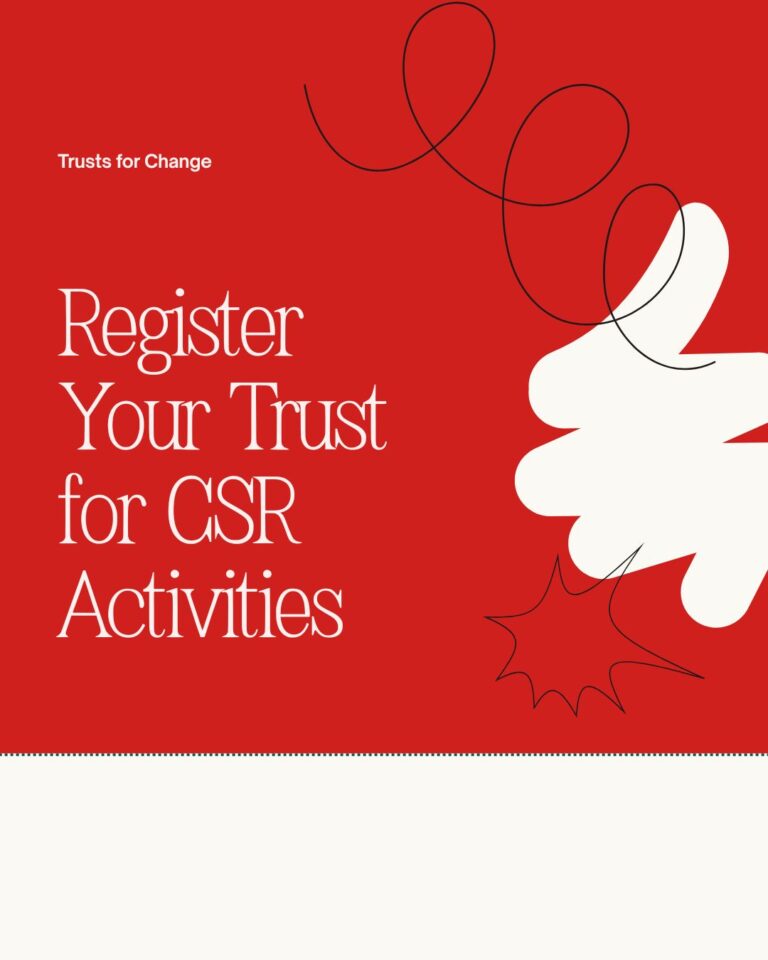CSR Registration for Trusts for CSR Activities
What is CSR Registration for Trusts?
CSR registration allows trusts to receive funds under Corporate Social Responsibility (CSR) initiatives. Trusts intending to carry out CSR activities must register with the Ministry of Corporate Affairs (MCA) by filing Form CSR-1. Without completing this registration, trusts cannot receive donations or funding from companies obligated to perform CSR activities under the Companies Act, 2013.

Eligibility for Receiving CSR Funds for Trusts
To be eligible for CSR funding, a trust must:
Be registered under Section 12A and 80G of the Income Tax Act.
Have a proven track record of engaging in charitable activities.
Be registered as a trust under the Indian Trust Act, 1882 or relevant state laws.
Register on the MCA portal by filing Form CSR-1 and obtaining CSR Registration Number.
CSR Registration Can Be Applied to Which Businesses?
CSR registration through Form CSR-1 applies to:
Registered Public Trusts.
Societies registered under the Societies Registration Act, 1860.
Section 8 Companies registered under the Companies Act, 2013.
Private trusts are not eligible for CSR registration or funding.

CSR-1 Registration Fees for Trusts
The professional service fees for CSR-1 registration vary depending on the consultancy you engage with. Government fees for filing CSR-1 are currently nil; however, professional charges for document preparation, compliance checks, and filing assistance may apply.
Documents Required for CSR Registration for Trusts
To complete the CSR registration process for trusts, the following documents are necessary:
PAN Card of the trust.
Certificate of Registration under the Trust Act.
12A and 80G registration certificates.
Trust Deed certified by the authority.
Details of Trustees (including PAN and Aadhaar).
Email ID and Mobile number of the authorized signatory.
DSC (Digital Signature Certificate) of the authorized person.
Authority letter authorizing the person to file CSR-1.
Contact details and address proof of the trust.

What CSR-Related Activities Are Allowed According to the Companies Act, 2013?
As per Schedule VII of the Companies Act, 2013, trusts can undertake CSR activities such as:
Eradicating hunger, poverty, and malnutrition.
Promoting education and special education.
Promoting gender equality and empowering women.
Ensuring environmental sustainability.
Protection of national heritage and art.
Contributions to disaster relief funds.
Promoting sports and rural development projects.
CSR activities must align with the government-specified areas and cannot be personal projects or activities outside the scope of the Act.
CSR Registration Benefits for Trusts
Some of the main benefits of CSR registration for trusts include:
Access to CSR funds from eligible companies.
Enhanced credibility and trust among donors.
Opportunity to scale up social impact projects.
Compliance with regulatory norms boosting reputation.
Ease of collaboration with corporates for social initiatives.
How Do I Apply for a CSR-1 Form for Trusts?
Here is the process for applying CSR-1 for Trusts:
Collect all necessary documents.
Ensure the authorized signatory has a valid DSC.
Prepare and validate Form CSR-1 with accurate details.
Attach the required documents.
Submit the form online via the MCA portal.
Upon successful verification, the MCA issues a CSR Registration Number.
CSR Registration for Trusts for CSR Activities
What is CSR Registration for Trusts?
CSR registration allows trusts to receive funds under Corporate Social Responsibility (CSR) initiatives. Trusts intending to carry out CSR activities must register with the Ministry of Corporate Affairs (MCA) by filing Form CSR-1. Without completing this registration, trusts cannot receive donations or funding from companies obligated to perform CSR activities under the Companies Act, 2013.
Eligibility for Receiving CSR Funds for Trusts
To be eligible for CSR funding, a trust must:
Be registered under Section 12A and 80G of the Income Tax Act.
Have a proven track record of engaging in charitable activities.
Be registered as a trust under the Indian Trust Act, 1882 or relevant state laws.
Register on the MCA portal by filing Form CSR-1 and obtaining CSR Registration Number.
CSR Registration Can Be Applied to Which Businesses?
CSR registration through Form CSR-1 applies to:
Registered Public Trusts.
Societies registered under the Societies Registration Act, 1860.
Section 8 Companies registered under the Companies Act, 2013.
Private trusts are not eligible for CSR registration or funding.
CSR-1 Registration Fees for Trusts
The professional service fees for CSR-1 registration vary depending on the consultancy you engage with. Government fees for filing CSR-1 are currently nil; however, professional charges for document preparation, compliance checks, and filing assistance may apply.
Documents Required for CSR Registration for Trusts
To complete the CSR registration process for trusts, the following documents are necessary:
PAN Card of the trust.
Certificate of Registration under the Trust Act.
12A and 80G registration certificates.
Trust Deed certified by the authority.
Details of Trustees (including PAN and Aadhaar).
Email ID and Mobile number of the authorized signatory.
DSC (Digital Signature Certificate) of the authorized person.
Authority letter authorizing the person to file CSR-1.
Contact details and address proof of the trust.
What CSR-Related Activities Are Allowed According to the Companies Act, 2013?
As per Schedule VII of the Companies Act, 2013, trusts can undertake CSR activities such as:
Eradicating hunger, poverty, and malnutrition.
Promoting education and special education.
Promoting gender equality and empowering women.
Ensuring environmental sustainability.
Protection of national heritage and art.
Contributions to disaster relief funds.
Promoting sports and rural development projects.
CSR activities must align with the government-specified areas and cannot be personal projects or activities outside the scope of the Act.
CSR Registration Benefits for Trusts
Some of the main benefits of CSR registration for trusts include:
Access to CSR funds from eligible companies.
Enhanced credibility and trust among donors.
Opportunity to scale up social impact projects.
Compliance with regulatory norms boosting reputation.
Ease of collaboration with corporates for social initiatives.
How Do I Apply for a CSR-1 Form for Trusts?
Here is the process for applying CSR-1 for Trusts:
Collect all necessary documents.
Ensure the authorized signatory has a valid DSC.
Prepare and validate Form CSR-1 with accurate details.
Attach the required documents.
Submit the form online via the MCA portal.
Upon successful verification, the MCA issues a CSR Registration Number.

